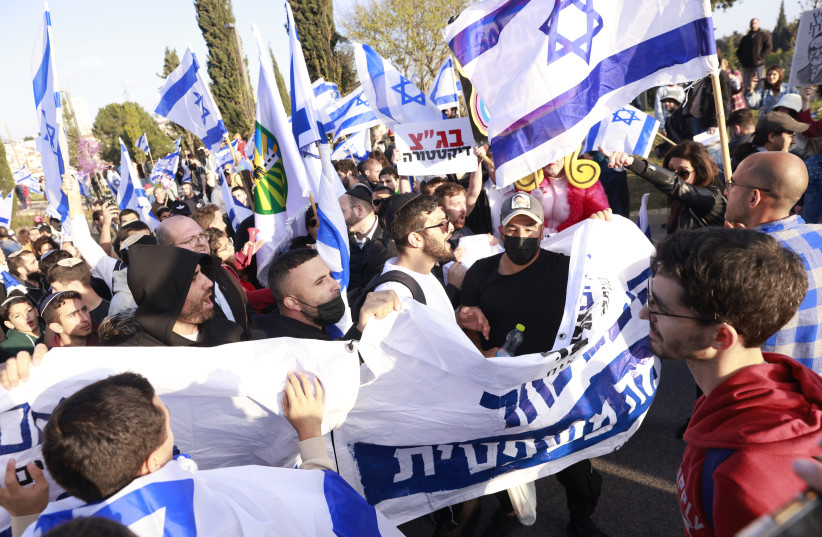The protest movement won. The victory is significant. The bad legislation has been stopped, for now. But this victory could prove to be a double-edged sword. It might forge a common path to a better future for Israel or, heaven forbid, it might pierce the nation’s heart. Vehement protest is justified when it aims to block immediate danger, such as the judicial revolution. But to influence the future of the country, there are elections. That’s where the battle between values and ideology has to be decided.
These are historic days. Through demonstrations with whistles, drums, signs and banners that virtually never devolved into violence, alongside civil disobedience measures, most of which were entirely legitimate, the protest brought a halt to the legislation. The mass protest movement launched at the start of the constitutional revolution managed to achieve its original goals in just a few weeks and succeeded in thwarting, for now, the danger that loomed over Israel’s image as a democratic state.
The protest leaders deserve praise. They managed to expand the circles of dissent far beyond the Black Flag movement, the Balfour demonstrators and other professional protesters. Women and men, senior citizens, teens, children, religious, secular and people who had never taken part in demonstrations flooded Israel’s streets. Activity peaked on the night of the defense minister’s dismissal. The hundreds of thousands who took to the streets didn’t need an organizer or a signal. A sense of fear and of responsibility for the country’s fate drew them from their houses to fight for their homes.
This achievement could enable Israel to celebrate its 75th year of independence in greater and healing unity but it could also prove disastrous, in the short or long term. The protest leaders and the politicians who see themselves as having charted the course may bask in their victory and try to decide Israel’s future in the streets. In the short term, that could, perhaps, produce mock achievements. In the long term, it would be a catastrophe.
The past few decades have been characterized by a fierce struggle for Israel’s image: its democratic values, the balance between the branches of government, the place of Judaism in the public sphere, the future of settlement in Judea and Samaria, equality in sharing the burden and more. These are fateful questions. Deciding on them one way or the other will indeed alter Israel’s character.

The endless elections intensified ideological debate
THE ENDLESS rounds of elections in the past few years further intensified the ideological debate and the past few weeks stretched it to its limit. Nevertheless, long-term, principled decisions cannot be made in the streets. These are precisely the issues that must be decided at the ballot box.
Now that the protest has removed the immediate risk to Israeli democracy, the time has come for dialogue. The window of opportunity secured by the protest, from now until the summer, must be used to reach agreeable solutions to the fateful issues concerning the status of the Supreme Court, its relations with the Knesset, the manner in which judges are appointed and others.
This should be done through political and public discourse, not displays of force. Basic Laws, checks and balances between government branches and a constitution are all essential for us. But they should be matters of agreement.
The protests’ success poses a significant temptation to its leaders: to persist with it to the point of perfect victory which, in the view of some of these leaders, means the overthrow of the sitting elected government. If this happens, God forbid, there would be no end to the cycle of violence. Neither side would ever accept the will of the electorate. From a great and prosperous nation, we would transform into a third-world country where there is never governmental stability.
The struggle over Israel’s core values will continue. The way to win is through persuasion and negotiation while employing only democratic mechanisms to reach decisions and strike agreements.
I appeal to the protest leaders: Display responsibility. Be statesmanlike. Don’t leverage this huge achievement to forcibly topple the government. Sit down, despite the mistrust, and talk with the elected government so that we can celebrate our 75th Independence Day and those to come with a little more unity.
The writer is the vice president of the Jewish People Policy Institute and a lecturer in law at the Peres Academic Center. His new novel We Didn’t Love Too Much was published by Yedioth Books and his just-released non-fiction work, Being a Nation-State in the Twenty-First Century: Between State and Synagogue in Modern Israel, was published by Academic Studies Press.
